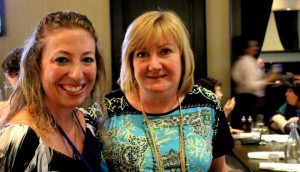Conference take aways 2013
The Apraxia conference was incredible to say the least. On one hand it was information overload, but on the other hand I learned so much.
I was beyond thrilled to meet Sharon Gretz, the founder of CASANA. What an incredible women and inspiration she is to me, and when I met her she was so down to earth and humble. We swapped stories and I immediately felt a kinship with her. It was also amazing to meet her son who was nonverbal at 5 talking and taking pictures of the conference. She reported he was in college maintaining a 3.25 GPA. Incredible.
The breakout sessions were awesome. I was never bored, though by the end I was tired. I just want to soak up as much as possible.
Some things that really struck me at this conference
– Apraxia could have a sensory feedback component as well as a motor component. One study showed that kids with CAS had a greater number of vegetative utterances in the first year. These include things like coughing, hicupping, and burping. The theory is that perhaps sensory feedback is to blame.
– Kaufman recommends taking sounds in the child’s repertoire, and then creating words from it. She didn’t just advocate her picture cards. She also said she chose items in her picture cards that were of high interest to the child. However, she also uses pictures on the iPad and in other materials. She’s also not concerned if the child doesn’t “remember” or “learn” some of the words since the goal is just to map the motor plan. For example, she said a child could go their whole life not knowing “oboe” and would probably be fine.
– Kaufman uses a lot of approaches for ABA verbal techniques. One was called errorless learning, in which you anticipate the child’s mistake before they say it and give them a cue to increase success.
– Brain imaging studies show that kids with apraxia have more brain centers lit up during talking tasks then do the neuro-typical peers. It shows just how hard they are working to talk.
– Children with apraxia are at increased risk for reading difficulties. Some reading programs that have shown success with children who have apraxia are the LIPS program, which allows a child to learn sound correspondence and sound segmentation receptively, as well as Phonic Faces.
I look forward to attending more conferences in the future! I also learned about an “Apraxia Bootcamp.” It’s a four day intensive training, but some of the top apraxia experts in the country. It’s apparently highly competitive, but I’m up for the challenge. I’m going to start gaining more experience with apraxia, and already started networking with other colleagues. I’m excited for what the future brings!
